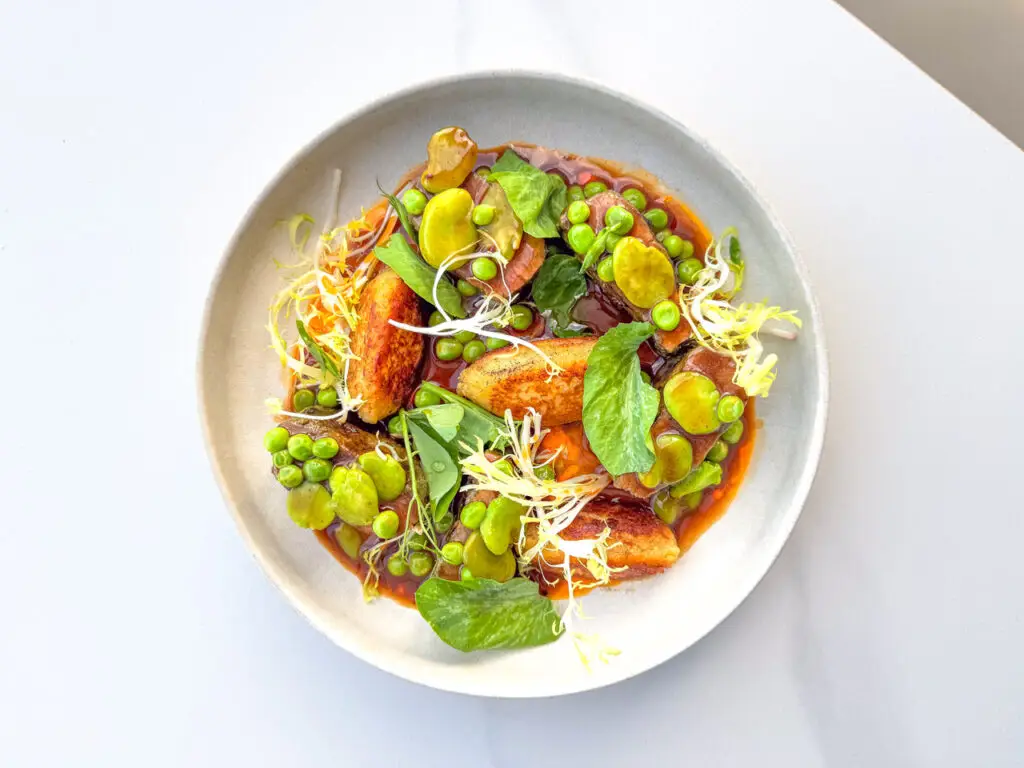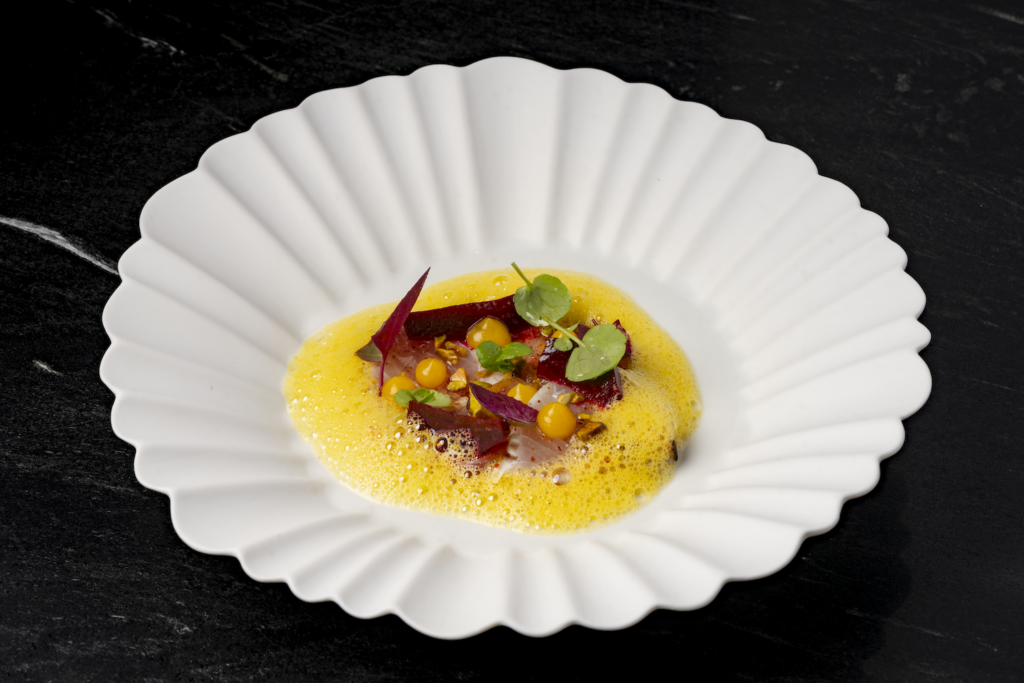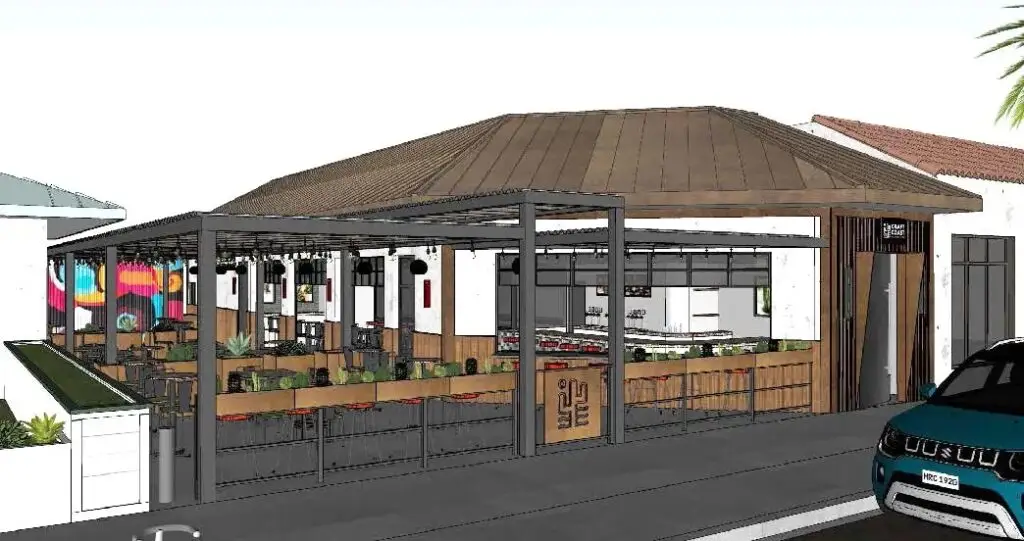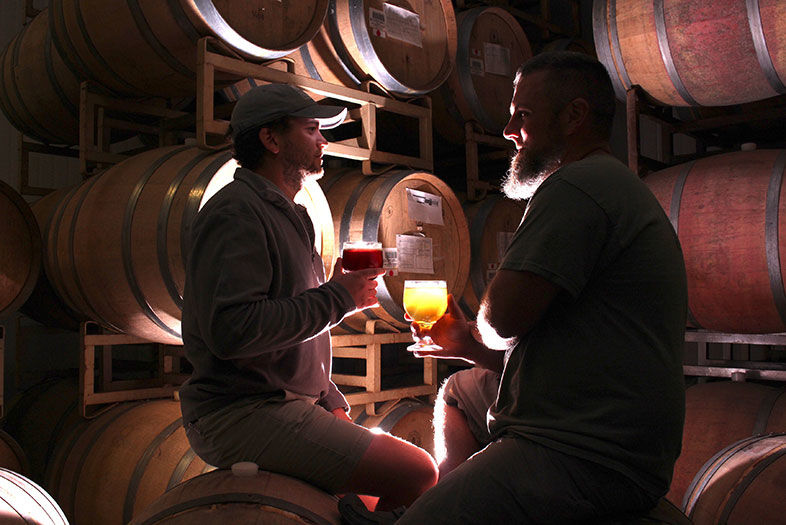They just celebrated their fourth anniversary, but—to me—it feels as if Societe has been part of the San Diego beer community for at least a decade. Maybe it’s because, before they opened, they spent countless hours in conversations with our established brewers, asking for advice, absorbing the San Diego brewing culture, and working to make sure everyone was cool with their coming onto the scene.
It was clear, long before Societe’s doors ever opened, that co-founders Doug Constantiner and Travis Smith had great respect for the reputation San Diego’s brewers had built and they were determined that Societe would live up to that standard. Their sincere respect for the brewers was quickly reciprocated once Societe opened; it earned them nearly unanimous praise from everyone within weeks of releasing their first batch. It also helped that they made great beer.
As someone who’s watched Doug and Travis from the early days (while they were still in the planning stages), I’ve always felt that they were guys who did everything right. They listened and learned from the pros, they based their brewery vision on solid and honest principles—their own deeply held convictions about what beer should and shouldn’t be—and they never waivered from those principles. The result, after four years, is that Societe is—as far as I can tell—universally loved by everyone who knows them and their beers.
When I sat down with Travis and Doug, we talked about where they’ve been, where they are, and where they hope to go. What I realized—as I sipped on a crisp and delicious Bachelorette Delta Single-Hop Lager and then a juicy, citrusy, Coachman Very Small IPA—was that, despite the nonstop outpouring of affection, acceptance, and support they receive, these two guys still carry with them an intense (albeit self-inflicted) pressure—the weight of responsibility they feel to their peers and their fans—and an honest feeling that they can still do everything better.
So, you’re celebrating your fourth anniversary, right? The actual anniversary is…
Doug: Somewhere around here. Actually, we had our soft opening May 5, 2012. That was when we first opened our doors. Our first day of business was a brewery tour tied in with the Craft Brewers Conference, which was in town that year. We had two beers on tap. Then we waited eight weeks and had our grand opening on June 30, 2012.
Travis: So, we have an eight-week period of time that we consider our “anniversary period.”
[Last Saturday, June 11, Societe hosted the first annual Brewers Games—an afternoon of Olympic-style but beer-centric events— to officially celebrate their fourth anniversary.]
You’ve only been around four years, but it kind of feels like you guys have been around forever. Does it feel that way to you? Do you feel like an established member of the beer community?
Doug: I feel established, but I still think we pale in comparison to guys that have been doing this since before we could drink (legally!). And it’s weird to think that, four years ago, there were fewer than half the brewers there are now. So we were at the tail end of that first big generation of breweries that opened.
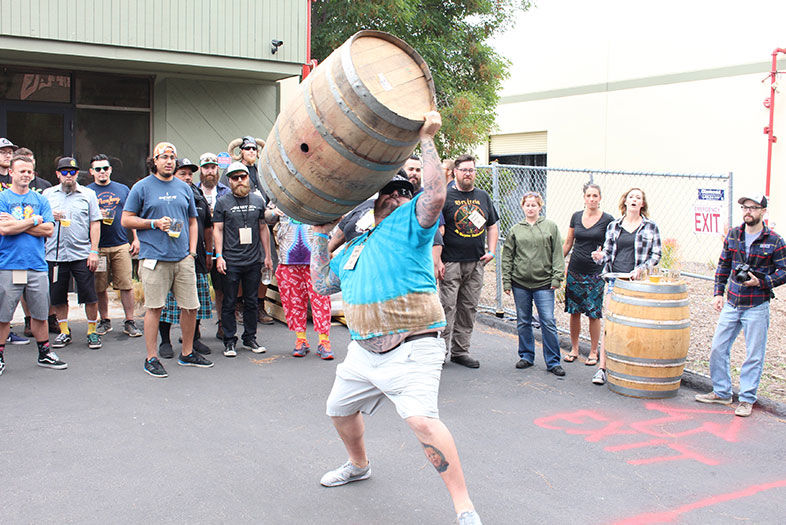
Have a Beer with Societe Founders Doug Constantiner & Travis Smith
Barrel-toss competition at Societe’s Brewers Games. | Photo by Bruce Glassman
Barrel-toss competition at Societe’s Brewers Games. | Photo by Bruce Glassman
How many breweries were open when you guys came on the scene?
Travis: Low fifties. Like fifty-two or so.
Doug: In that sense, it does feel that we’re more grounded and established, but we look at four years and think that’s absolutely nothing. We haven’t proven ourselves yet.
About 70 or 80 breweries have opened up since then. Has that incredible growth changed your game plan in any way?
Travis: The only thing it’s changed for me is not being in touch with all the breweries that are out there. When we first opened up, we visited every single brewery in the county, and now I haven’t been to half of them.
Before you opened, you did a lot of due diligence with the brewers in town. You were very conscious of making sure you were going to do right by them.
Doug: Yeah. At least try to do right.
Travis: That was part of our rationale for visiting everyone. We wanted to make it clear that we didn’t want to step on their toes, or ride on their heels, but we wanted to actually be part of the community and benefit the community, not just take advantage of it.
Have you had some of the new guys come to you for that same sort of conversation and advice?
Doug: Yeah, Bitter Brothers, for one. A bunch have come by. What I’ve noticed now is that it’s breweries that are newly opened. Once they’re open, then they reach out and say, ‘Hey, I’ve got a brewery, now,” which is totally fine. They might have thought that we’re not going to talk to them if they’re only in the planning stages. We also do get a lot of emails, but we just can’t meet with everybody.
What are the sorts of things people are asking about? Are they asking you how to make a great IPA?
Travis: No. Nor would we answer that! If they don’t know how to do that, they shouldn’t be in the business! There’s so much that people need to know—even we are still learning—about building, construction, the permitting, what kind of equipment you can use…
Doug: I get a lot of stuff about business structure and benefits for employees. I get a lot of operational questions. Lease agreements. Stuff like that.
“…We look at four years and think that’s absolutely nothing. We haven’t proven ourselves yet.”
Looking back over the past four years, what’s surprised you the most about how it’s gone so far?
Doug: We have a lot more employees than we expected to have in year four. We have 24. Our original plans did not account for this many employees. And our tasting room has done much better than we thought it would; half of our employees are tasting room.
And in terms of production, are you ahead of where you thought you’d be?
Travis: Actually we’re a little behind.
Doug: But it’s really because of a bottleneck that we caused. Last year, we overestimated our sales and delivery capacities. We thought two people would be sufficient, but it wasn’t. We couldn’t brew because we didn’t have the labor to get the beer out into the market. So it wasn’t that there wasn’t enough sales, it was that we physically and literally couldn’t get the beer to all these places. I’d rather have that be our mistake than it be a quality issue from growing too quickly.
So that was one miscalculation that you learned by doing. Are there other things, looking back over the past four years, that you feel you learned through a trial by fire?
Doug: Yeah. When we started the brewery, craft beer was obviously popular and it had a huge following, but not like it is today. I think about how competitive it has gotten from a marketing standpoint and it’s pretty surprising. We’re going up against really talented, impressive, small companies that are not only making great beer, they can also tell their story so well. They bring so much more to the game. In contrast, Travis and I began by saying, ‘Alright, let’s run a good company, let’s tell our story, but the focus will always be on the beer.’
Do you feel you’re not as good as most at telling your story?
Doug: We’re okay at it, but we’re okay based on the standards set eight years ago, when it was a few breweries that were killing it with marketing like Dogfish Head and Stone and places like that. Now you have small breweries—you even see nanos—killing it with marketing. We knew when we opened that gone are the days when a brewery like Russian River or Alpine can function—meaning you have arguably some of the best beer in the world and no marketing presence to back it up. You’re going based off quality of beer and reputation alone. But now there are breweries—not only here—they’re nanos that are not making a lot of beer, but they’re making a huge name for themselves through the power of brand. We still ride on the quality of our beer and our namesake, which I think makes up for the fact that we’re not marketing people.
Would you ever consider hiring a marketing person?
Doug: If we ever hired a marketing person they wouldn’t have more than a couple of hours of work to do here a week, because the answer from us would always probably be ‘no.’ We understand the ways to market, and understand the things we could be doing, but it’s just not us.
Looking at it from the other side, how much more beer do you actually want to be making right now that you’re not actually selling?
Doug: Exactly. Almost on purpose, we short the market. Our model is not the typical model where there’s demand and you increase production to meet demand. That causes you to then buy more tanks, hire more employees, and make more beer to afford those people, and it’s just that cycle. I think to do that perfectly, you have to have .01% more beer made than what is demanded. For our model, we just say we’re going to make what we can, and what we can move.
Travis: We actually make far less than the demand.
Doug: We could bring on three sales guys tomorrow and max out this facility overnight, but then we’re going into places we haven’t built a relationship up with. We want education for our retailers—so they understand who Societe is—that’s really important to us. Again, if you’re in it for growth and fast numbers, education is less of a concern than is meeting demand.
You’ve always been concerned about the provenance of the places that carry your beer.
Travis: That’s right, because they can ruin our beer.
Doug: In a very real way, every bartender out there is a sales person for each brewery they serve.
How do you decide on potential new accounts?
Travis: They all get vetted.
Doug: It’s rare that we know nothing about a place. Usually we know the beer buyers because they bounce around, so we’ll know them even at the new places that open up. If it’s a random restaurant that we’ve never heard of, we’ll go in and check them out. If there’s anything in question, we’ll talk to other breweries. It’s pretty serious. We lay out pretty clearly what we expect from them and also what they’ll get from us, which is good beer and good customer service.
Are you still holding to your original vow that you’ll never bottle an IPA?
Doug: Travis and I still don’t know what we’re going to do in 2017!
I just wanted to know if some of the early maxims are still holding…
Travis: As of right now, that’s still holding.
How about Belgians in bottles?
Travis: I would love to have some of our Belgians in bottles.
And of course, the sours…
Doug: We’ve actually bottled a batch up and it’s ready for sale. It’s called The Swindler. It’s a blonde sour, 6.4%. It’s middle-of-the-road, but not in a boring way. In the way that The Harlot was our first beer, Swindler is kind of the same thing. It’s a baseline beer, nothing too crazy going on with it.
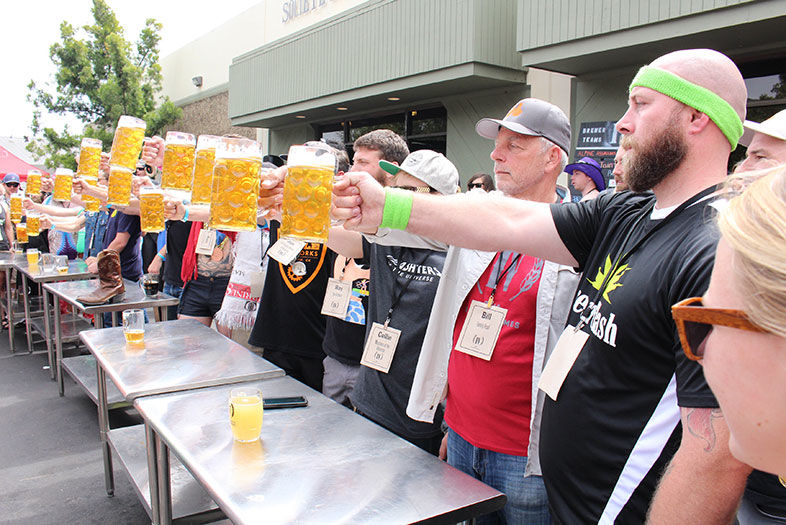
Have a Beer with Societe Founders Doug Constantiner & Travis Smith
Stein-holding competition at the Brewers Games. | Photo by Bruce Glassman
Stein-holding competition at the Brewers Games. | Photo by Bruce Glassman
You both have always said you’re big fans of beer that tastes like beer. Would you ever consider adding flavor components to some of your beers?
Doug: We both strongly agree that you can incorporate other components into a beer but they have to be part of the whole composition; part of the whole symphony of flavors.
Travis: We use some non-Reinheitsgebot ingredients in our beers that we don’t advertise because it’s not something we want to draw attention to; it’s for a certain flavor. The Widow has orange peel in it, but we don’t say it’s an orange peel beer because it’s such a minor component and if you’re looking for it, you might not find it. It’s something on the overall palate.
Would you consider adding components to an IPA or a pale ale?
Travis: We add lots of hops. I think that’s what IPA is about. I’m not a big fan of what I call the ‘IPA-a-ritas’ that are around.
Let’s look into the future. What do you hope to accomplish in the next four years?
Doug: We’re about to renew our lease, so we’ll be here for another five years. Chances are we’ll be here for another ten years. Probably making the same amount of beer. The goal is to make as much beer as we can sell in San Diego. We’re not going to try to open new markets.
For the next ten years, San Diego is as far and wide as you want to go?
Doug: For the foreseeable future, that’s going to be the main focus.
Why is that? Is that from a production level or volume standpoint?
Travis: Our self-distribution is a big part of our quality enforcement, and places like L.A. are too far for us. In order to reliably make sure that our beer is well taken care of, we need to have those account relationships. So that’s why, when we’re focusing on moving our beer, we’re focusing on doing it in our own backyard.
Doug: And we don’t want to leave this market until we’re fairly sure that it’s maxed out—by us. There will be a point when we say we can’t move any more beer in San Diego so let’s look at some other places. But right now, we’re doing five times as much beer as we were doing four years ago… in the same city. We’re not relying on new markets to grow and, to me, that defines organic growth. When we were at 1,000 barrels a year we thought we could probably double that and now we’ve gone way past that. We kind of think, ‘Why short San Diego in order to sell somewhere else?’
And San Diegans are your most-loyal fans.
Doug: Absolutely. They know us the best. We’ve seen how big our following is in the San Diego community, but we can go to New York City—even Portland—and people don’t know who we are. So it wouldn’t make sense for us to lose money and spend resources to get our beer into these faraway markets—and they’re great beer markets—if they don’t know who we are, or understand us. San Diegans know our background.
Travis: This is our local market. It’s our bread and butter. It’s why we came here in the first place.
Doug: And every stressful part of the business, every downside, every doubt about whether we should be doing things a different way, it all completely goes away when people come into the tasting room and tell us we’re their favorite brewery. I don’t care if they say we’re the best—but when they say we’re their favorite and we should keep doing what we’re doing, and don’t change—that, to me, is everything.
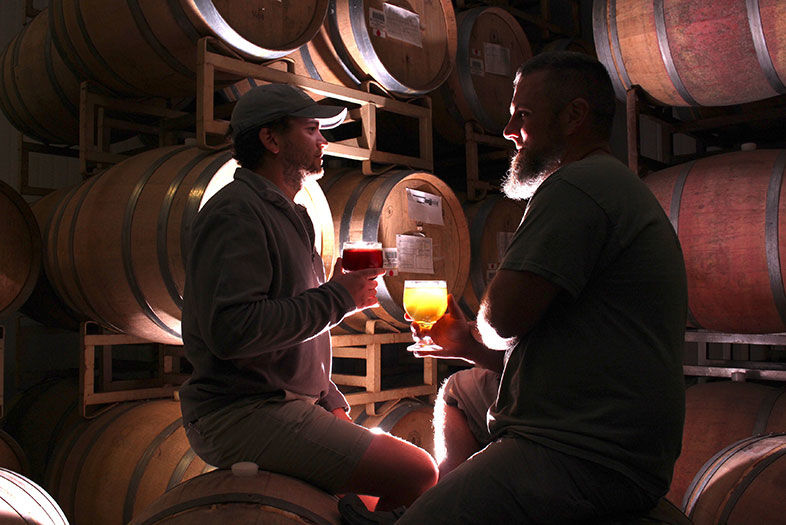
Have a Beer with Societe Founders Doug Constantiner & Travis Smith
PARTNER CONTENT
Societe Co-Founders Doug Constantiner and Travis Smith. | Photo by Bruce Glassman

